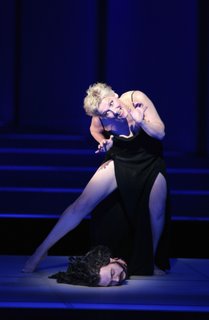Letters from Munich: Das Gehege/Salome
 Angela Denoke as Salome
Angela Denoke as SalomePhoto: Wilfrid Hoesl
The climax of my Strauss week in Munich was reached in a spectacularly powerful performance of the double-bill, Wolfgang Rihm's Das Gehege paired with Strauss's Salome. Given that the director was William Friedkin of Exorcist fame, the audience rightly expected something visceral and galvanizing, if not downright gory - what better opera for gore than Salome? The public largely got its wish when it premiered in 2006. Critical reactions were positive. According to Dr. Ulrike Hessler, director of communications and development of the Bavarian State Opera, for once there was no booing after the performance, only cheers. This certainly was true on July 26.
The opening piece was the 35-minute Das Gehege ("The Cage"). At the premiere in October 2006, critics and audience had a field day speculating on the meaning of this work. Rihm based it on Botho Strauss's 1991 play Final Chorus, on the fall of the Berlin Wall. There are only two characters, one singer (Die Frau), and a non-speaking role of the caged eagle, masked and costumed in black tights and black feathers. The woman sets the eagle free, yet cannot resist taunting it and eventually killing it. Perhaps the "eagle" represents East Germany, and setting it free would be an allegory on the fall of the Wall. Its subsequent demise in the hands of Die Frau would appear to be a dark commentary on present-day German politics. But to my eyes and ears, this piece is strong enough musically to stand on its own without the political subtext. Rihm has composed a powerful - yes, even occasionally beautiful - score that is distinctly contemporary without being inaccessible or alienating. He wrote the role of Die Frau for soprano Gabriele Schnaut, who has a reputation for championing contemporary compositions. She was on stage the whole 35 minutes, showing remarkable stamina given that she had just sung the taxing Elektra the previous evening! She displayed the utmost dramatic commitment, sang with vocal abandon if not beauty of tone, but then perhaps none is required here! Der Adler ("The Eagle") was vividly acted by Steven Barrett. If I were to nitpick, I find the sets aesthetically icy, but then perhaps that was the point.
After a 40 minute intermission came Salome, with Angela Denoke reprising the title role. I have not always enjoyed her work, especially in roles too heavy for her instrument such as Leonore in Fidelio. But she is superb here, the very embodiment of Salome in every way. Costumed in a low cut black gown with slits on both sides up to the hip, this Salome is child-like, petulant, wilfull, seductive, playful, vulgar, sexy, manipulative, and altogether lethal as any good Salome should be. Denoke finds the role more vocally congenial than one would imagine possible, paying great attention to textual nuances, and varying her tone in the repeated demands for the head of Jochanaan. Having seen about a dozen Salome productions, I wasn't really expecting any surprises, but surprised I was! The sheer inventiveness of the Dance of the Seven Veils rivals the Atom Egoyan production for the COC, and Friedkin doesn't have the benefit of projections and shadows to mask any potential problems. Salome dances not just to Herod, but to Herodias, the Page, the Jews, even Jochanaan, coveniently brought up from underground thanks to the marvels of modern stage machinery. The veils fall the ceiling, caught by Salome who proceeds to use them to lasso her victims. As the dance approached climax, Denoke stripped to the waist, but unlike others, she remained topless and sang for extended periods afterwards. At this point, the Eagle in Das Gehege reappeared as a sort of "Angel of Death", directing the stage action, leading the drama inexorably to its denouement.
With such a powerful singing actress, others in the cast were rather overshadowed. Alan Held (Jochanaan) sang strongly, but this rather one-dimensional character didn't offer a whole lot of dramatic nuances. Iris Vermillion made the most of Herodias, a most ungrateful role. Herod has much meatier music to sing, and former heldentenor Wolfgang Schmidt certainly dug into it with relish, his voice in surprisingly good condition, a hint of a wobble notwithstanding. But the most outstanding singing in a supporting role came from the Narraboth of Korean tenor Wookyung Kim, whose trumpety tones were a pleasure. He was extremely well applauded at the end. Hans Schavernoch's rather anticeptic set design served both the Rihm and the Strauss - its many moving arches worked better in the latter. If Denoke was the star of the evening, she arguably shared it with the orchestra under the splendid conducting of Kent Nagano - how often does one feel the orchestral sounds all the way down to one's toes?
Labels: Nagano




0 Comments:
Post a Comment
<$I18N$LinksToThisPost>:
Create a Link
<< Home